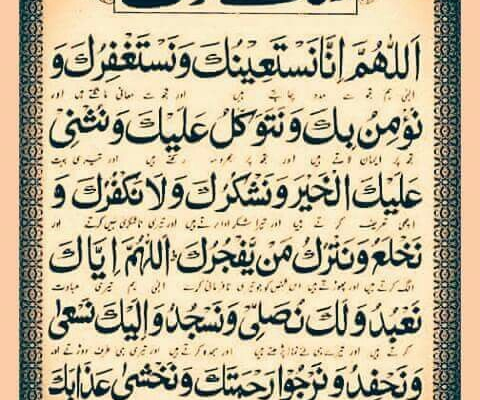

He was further asked, “Did he recite Qunut before bowing?” Anas replied, “He recited Qunut after bowing for some time (for one month).” Sahih al-Bukhari 1001 Qunoot in Fajr – Narrated Muhammad bin Seereen: Anas was asked, “Did the Prophet (ﷺ) recite Qunut in the Fajr prayer?” Anas replied in the affirmative. No, the dua e-qunoot is not mentioned in the Qur’an it is the Sunnah of the Prophet (ﷺ). Can the Qunoot dua be found in the quran? It’s also acceptable the qunoot dua be done done before going into the ruku.

After finishing the imam would say takbeer, “allahu akbar” and go into sujud. You would then raise your hands for supplication and recite the qunot. after saying sami allahu liman hamidah rabbana lakal hamd). Most scholars say the Qunoot should come after bowing or after the Ruku (i.e.
#DUA QUNOOT WITH MEANING HOW TO#
This is Ruku Position – Image from our complete guide teaching Muslims how to preform salah. This was quoted by Ibn Muflih in his comment on al-Muharrar, 1/89 dua qunoot before or after ruku

He said: If one adds to that the words narrated from ‘Umar (may Allah be pleased with him), “Allahumma inna nasta‘eenuka… (O Allah, we seek Your help)…”, there is nothing wrong with that. He said: What is mustahabb in our view is that which was narrated by al-Hasan ibn ‘Ali from the Prophet (blessings and peace of Allah be upon him): “Allahumma ihdini…” – the well-known hadeeth. Ibn ‘Uqayl al-Hanbali (may Allah have mercy on him) narrated that dua’s narrated from the Prophet (ﷺ) should be what is recited as regular word, and anything added to it is by way of a concession. Surely, the disbelievers shall incur your torment. O Allah! We worship you and prostrate ourselves before you, and we hasten towards you and serve you, and we hope to receive your mercy and we dread your torment. Meaning: O Allah! We invoke you for help, and beg for forgiveness, and we believe in you and have trust in you and we praise you, in the best way we can and we thank you and we are not ungrateful to you, and we forsake and turn away from the one who disobeys you. And Allah knows best.Hanafi commonly recite second version of Dua-E-Qunot. These two forms of (Du'a') supplication are not from the Holy Qur'an. It is also advisable to end your Du'a with: 'Blessing and peace of Allah be upon our beloved Prophet Muhammad'. Truly, Your earnest punishment shall overtake the unbelievers'. O Allah, You alone do we worship, to You we pray and prostrate, You we strive for and hasten to obey, hoping for Your mercy and fearing Your punishment. In You we believe, on You we rely, You we praise with every good, we are grateful to You and not ungrateful, and disown and abandon him who commits outrages against You. 'O Allah, we ask your help, Your forgiveness, and Your guidance. 'Umar ( ) used to supplicate this Du'a in Qunut'. nothing is known from the Prophet concerning qunut more authentic than that. al-Tirmizhi grades this Hadith as Hasan, and says: ". ' Imam Shafi, Imam Ahmad, al-Termizi, an-Nasa'I, Abu Dawood, Ibn Majah narrated this Hadith. And there is no humiliation for whom You take as a ward. Protect me from the evil that You have decreed, for You decree and nothing is decreed for You. Take me into Your charge among those whom You have taken into Your charge. Grant me safety among those whom You have granted safety. Praise be to Allah, the Lord of the Worlds and may His blessings and peace be upon our Prophet Muhammad and upon all his Family and CompanionsĪl-Hassan Ibn Ali said: "The Messenger of Allah taught me the words to say in the witr prayer: 'O Allah, guide me among those whom You have guided.


 0 kommentar(er)
0 kommentar(er)
